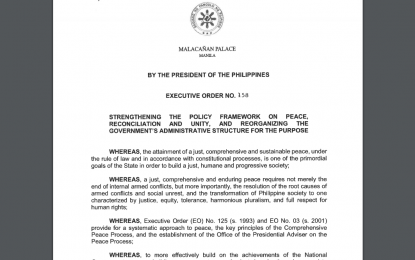
MANILA – President Rodrigo Duterte has signed an executive order (EO) reorganizing and renaming the Office of the Presidential Adviser on the Peace Process (OPAPP) to the Office of the Presidential Adviser on Peace, Reconciliation and Unity (OPAPRU).
EO No. 158, signed by Duterte on Dec. 27, guides the policy framework on peace, reconciliation, and unity with three principles namely “conflict-sensitive and peace-promoting”, “whole-of-society”, and “empowering”.
“To more effectively build on the achievements of the national government on peacebuilding engagements over the last decade, there is a need to continually reassess and realign how policies and programs on peace processes are designed, implemented and monitored, and expand the framework on peace to include initiatives that reinforce national reunification and reconciliation, as part of enhancing resiliency, and social, political and economic reengineering,” the EO read.
Under E0 158, the administrative structure to operationalize the policy framework on peace, reconciliation, and unity shall be led by the President, who shall provide over-all policy direction in the conduct of the comprehensive peace process.
The Presidential Adviser on Peace, Reconciliation and Unity (PAPRU) shall be appointed by the President and shall have the rank and remuneration of a Cabinet Member.
Functions and responsibilities of the PAPRU include managing, directing, integrating, and supervising all aspects of the comprehensive peace process, including initiatives that promote and reinforce national reconciliation and unity.
The PAPRU shall formulate and recommend to the President policies, strategies, programs, and actions to implement the comprehensive peace process, as well as measures that contribute to existing reconciliation and reunification efforts
It shall also oversee the status of programs and projects undertaken by government agencies and instrumentalities as part of the implementation of the comprehensive peace process, such as, the PAyapa at MAsaganang PamayaNAn (PAMANA) Program;
The PAPRU is also tasked to conduct regular dialogues with peace partners to seek relevant information, feedback and recommendations, as well as to render appropriate and timely reports on the progress of the comprehensive peace process to the President and recommend legislative and constitutional reforms toward the attainment of lasting peace, unity and reconciliation.
EO 158 establishes Government Peace Negotiating Panels (GPNPs), each composed of a chairperson and such number of necessary members, who shall be appointed by the President as his/her official emissaries to conduct direct negotiations, dialogues, and discussions with the rebel groups.
GPNPs shall report to the President through the PAPRU, on the conduct and progress of their negotiations.
Each GPNP shall be provided technical support by a Panel Secretariat, which shall be under the direct control and supervision of the Panel Chairperson.
Upon the signing of a final peace agreement with a rebel group, the concerned GPNP shall be dissolved and a counterpart Government Peace Implementing Panel (GPIP) may be created, whose members shall be appointed by the President, to engage the relevant rebel group for the implementation phase of the peace agreement.
Each GPIP shall be supported by a Panel Secretariat, which shall be under the direct control and supervision of the Panel Chairperson.
The funds necessary to implement this order shall be sourced from the current appropriations of the OPAPP. Funding requirements for subsequent years shall be included in the annual General Appropriations Act, subject to the usual budget process.
There shall be a Panel of Advisers for each of the GPPs, composed of representatives from the Senate, House of Representatives, members of the Cabinet, and representatives of civil society and other advisers as may be designated by the President, upon the recommendation of the PAPRU. (PNA)
